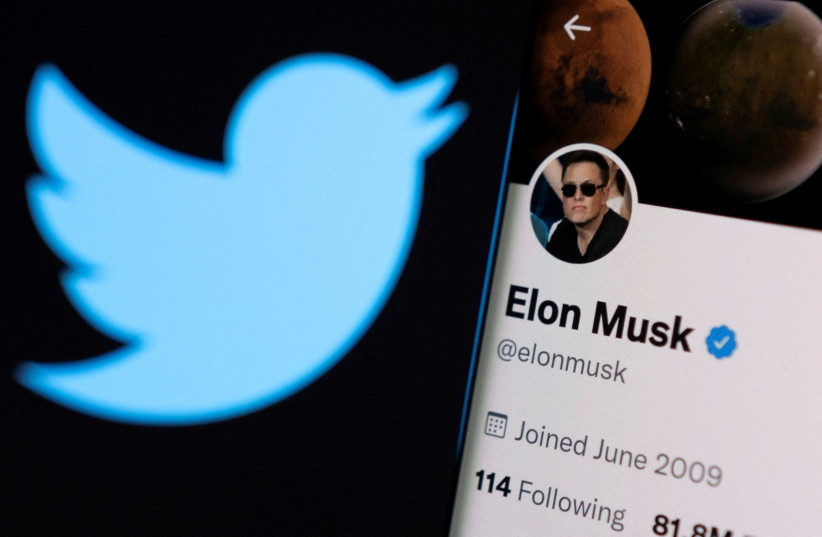Public figures have declared they are signing off Twitter for good. Progressive outlets have decried that Twitter will no longer be a safe space for people of color. Feminist publications are warning that harassment against women on the platform is set to rise dramatically. Similar concerns were raised regarding openness to antisemitism and racism.
These are only a few of the dire predictions from pundits who believe Elon Musk’s decision to purchase Twitter for a staggering $44 billion will result in a Wild West on social media where everyone is allowed to say anything with no consequence. But the reality, like the man himself, is more complex.
There are two versions of Elon Musk. There’s Musk the idealist – the man who wants to access Mars and make electric cars the norm. There’s also Musk the businessman – a shrewd mogul who has managed to accrue some $265b. by the age of 50.
But which Musk was behind the seemingly out-of-the blue decision to buy Twitter?
It’s far too early to tell, yet influential figures like Anti-Defamation League CEO Jonathan Greenblatt tweeted, “Twitter has made some strides in tackling this hate in recent years. So while we want to be cautiously optimistic about how @ElonMusk will run the platform, he hasn’t demonstrated any focus on these issues to date. We worry he could take things in a very different direction.”

Yes, Twitter – and most social media platforms – can be a cesspool of incitement, harassment and hate speech, with Jews often being the target. Aside from banning Holocaust denial rhetoric in 2020, not much was done to combat those threats and it’s unclear if Musk will maintain that status quo in his quest to secure free speech for all.
In this mega-purchase, Musk has promised to bring back the public square. But even in that bygone era, there were certain limits as to what can and can’t be said.
When Musk declared he hopes Twitter will be the platform of free speech, it’s unclear what exactly he means by that. Does that include incitement, tweets and violence from ISIS members, or racist ideas? Free speech is a nice goal in theory, but what are the limits for Musk?
So far, he’s expressed some promising ideas like no longer allowing anonymous posts, fake identities and bots. But how can he enforce that?
Musk mentioned that plans to alter Twitter’s algorithm – which suggests other tweets for users based on who they’ve interacted with previously – to a more “open source to increase trust.” In a recent TED Talk, he said, “People can look through it and say, ‘Oh, I see a problem here, I don’t agree with this.’ They can highlight issues and suggest changes, in the same way that you update Linux or Signal.”
While more transparency sounds like a good move, executing it may be far too complicated from a technological standpoint.
Further, he hasn’t mentioned if the algorithm will protect certain demographics. Will he tweak the algorithm so minors aren’t subjected to seeing hate speech?
He’s also said that following his purchase, Twitter will now be private, but does that mean more internal regulations or less?
It’s difficult to imagine that anyone – even a billionaire – drops $44b. impulsively, but Musk does seem to have made a hasty purchase, especially considering the platform is waning in popularity compared to TikTok and Snapchat.
We do know that Musk’s newest acquisition will enable him to wield more power, influence and political leverage – most likely the same reason why Amazon’s Jeff Bezos bought The Washington Post in an era when print journalism is on the decline.
And yet, while far-right activists and conservatives seem to rejoice that Twitter will once again be free, I would predict that jubilation may be premature. After all, if Musk wants to make the platform inclusive and profitable there is only so much controversy it can withstand.
For now, though, I’d like to give Musk the benefit of the doubt and predict that he doesn’t want people openly preaching for hatred, violence, antisemitism or racism. Instead of panicking, I caution the public to further examine what it means that we have billionaires – including Meta’s Mark Zuckerberg – dominating the majority of our lines of communication with the outside world.
Will they only think of profits and the size of their audience or also care about upholding democracy and what’s best for society? This is something they will have to balance and we will have to hold them accountable accordingly. Until then Musk is still behind a mask.
The writer is a professor at the University of Haifa and an expert on the study of media effects and political campaigns.
